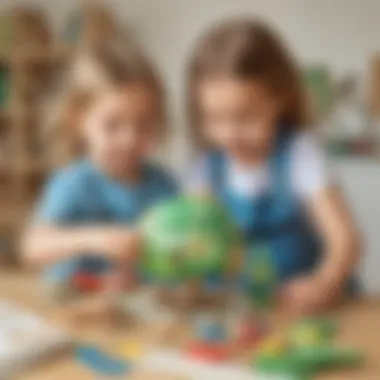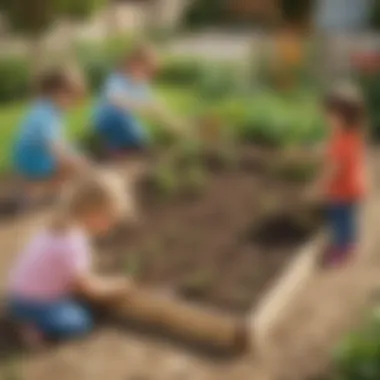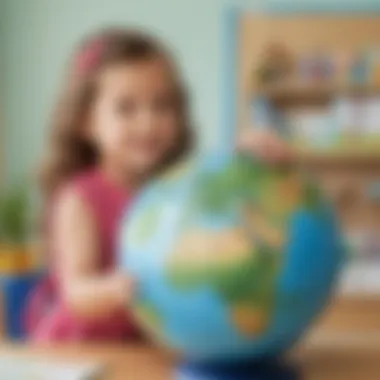Engaging Earth Week Activities for Preschoolers to Foster Environmental Awareness


Fun Activities Ideas
When it comes to engaging preschoolers in Earth Week activities, there are various fun and educational options to explore. From indoor activities that spark creativity to outdoor adventures that connect children with nature, there is something for every young learner.
Indoor Activities
Indoor activities provide a cozy setting for young minds to delve into the wonders of the environment. Consider setting up a mini eco-friendly garden in a corner of the classroom, complete with mini plants and recycled containers. Children can learn about plant growth and nurturing while fostering a love for nature. Additionally, organizing a recycling station where kids can sort materials and create upcycled crafts promotes the importance of waste management.
Outdoor Adventures
Immersing preschoolers in outdoor adventures during Earth Week ignites a passion for exploration and environmental stewardship. Plan a nature walk in a nearby park or nature reserve, encouraging children to observe plants, insects, and wildlife while soaking in the fresh air and sunshine. Engaging in a scavenger hunt for natural items like leaves, rocks, and feathers adds an element of excitement to the outdoor experience.
Arts and Crafts
Arts and crafts activities not only enhance fine motor skills but also foster creativity and environmental awareness. Try eco-friendly crafts such as making bird feeders from recycled materials or creating nature-themed collages using leaves and flowers. These hands-on projects merge artistry with sustainability, teaching preschoolers the value of repurposing materials.
Science Experiments
Incorporating science experiments into Earth Week activities exposes children to the wonders of the natural world. Conduct simple experiments like creating a mini compost bin to demonstrate the decomposition process or observing the effects of water pollution on a homemade aquatic ecosystem. These interactive experiments effectively demonstrate environmental concepts in a tangible way.
Cooking and Baking
Cooking and baking activities centered around Earth Week offer opportunities to explore sustainable food practices and healthy eating habits. Encourage children to participate in preparing plant-based snacks or baking treats using locally sourced ingredients. Through these culinary experiences, preschoolers develop an understanding of the connection between food, the environment, and personal well-being.
Introduction
Importance of Earth Week for Preschoolers
Teaching Environmental Awareness
Teaching environmental awareness to preschoolers is fundamental in shaping their understanding of the world around them. It cultivates a sense of responsibility and empathy towards nature, fostering a mindset of stewardship from a young age. Through hands-on activities and age-appropriate lessons, children absorb environmental concepts more effectively, setting a strong foundation for future environmental advocacy.
Fostering a Love for Nature
Fostering a love for nature instills a sense of wonder and respect for the natural world. This aspect of Earth Week activities encourages preschoolers to explore outdoor spaces, observe wildlife, and connect with the environment on a personal level. By nurturing this bond with nature early on, children are more likely to develop lifelong environmentally conscious behaviors and attitudes.
Instilling Sustainable Practices


Instilling sustainable practices involves teaching preschoolers simple yet impactful actions they can take to reduce their ecological footprint. By introducing concepts like recycling, composting, and energy conservation, children learn the importance of sustainable living firsthand. These practices not only benefit the environment but also encourage critical thinking and problem-solving skills in preschoolers.
Overview of Earth Week
History and Significance
Understanding the history and significance of Earth Week allows preschoolers to grasp the importance of this annual event. Exploring the roots of Earth Week and its evolution over time provides context for the environmental challenges our planet faces today. By acknowledging the contributions of environmental activists and the milestones in eco-conscious movements, children develop a sense of interconnectedness with the global community.
Goals and Objectives
Setting clear goals and objectives for Earth Week activities helps preschoolers channel their energy towards meaningful outcomes. By defining achievable targets such as planting trees, reducing waste, or learning about endangered species, children engage in tangible actions that contribute to a sustainable future. These goals foster a sense of accomplishment and empowerment, shaping the way preschoolers perceive their role in environmental preservation.
Outdoor Activities
Outdoor activities play a pivotal role in fostering a deep connection with nature among preschoolers. Particularly in this article, outdoor activities are highlighted due to their ability to engage young children in hands-on learning experiences that promote environmental awareness and conservation. These activities provide a unique opportunity for preschoolers to explore the natural world, develop a love for the environment, and instill sustainable practices from a young age.
Nature Walks
Nature walks are an essential component of outdoor activities during Earth Week for preschoolers. They offer a firsthand experience of the surrounding environment, allowing children to engage with nature in a meaningful way.
Collecting Leaves and Rocks
One of the key aspects of nature walks is collecting leaves and rocks, which serves as a tactile and sensory experience for preschoolers. This activity encourages children to observe and appreciate the diversity of plant life and geological features in their environment. Collecting leaves and rocks aids in developing observational skills, fostering curiosity, and enhancing awareness of the Earth's natural elements.
Identifying Plants and Animals
Identifying plants and animals during nature walks provides preschoolers with an educational opportunity to learn about biodiversity. By recognizing different plant species and animal inhabitants, children gain knowledge about ecosystems and the interdependence of living organisms. This activity promotes environmental literacy and instills a respect for all forms of life.
Creating Nature Journals
Encouraging preschoolers to create nature journals during nature walks enhances their observational and artistic skills. By documenting their findings, children engage in reflective practice, record their discoveries, and express creativity through drawings and descriptions. Nature journals serve as valuable keepsakes that capture the essence of their outdoor exploration and environmental experiences.
Gardening Projects
Gardening projects are a practical and engaging way for preschoolers to connect with the Earth, learn about plant life cycles, and cultivate an appreciation for gardening. These hands-on activities allow children to witness the growth process firsthand and participate in nurturing plants.
Planting Seeds
Planting seeds is a fundamental gardening activity that introduces preschoolers to the concept of plant growth and care. By sowing seeds, children witness the transformation from seed to plant, fostering a sense of responsibility and connection to nature. This hands-on experience encourages patience, curiosity, and a deeper understanding of the natural world.


Learning About Plant Life Cycles
Exploring plant life cycles through gardening projects educates preschoolers about the stages of growth and development in plants. By observing seeds sprout, plants mature, and flowers bloom, children learn about the vital processes that sustain all living organisms. Understanding plant life cycles instills a sense of wonder and appreciation for the intricate interconnectedness of the natural world.
Creating a Mini Garden
Creating a mini garden provides preschoolers with a sense of ownership and accomplishment as they design and tend to their small botanical space. This hands-on activity allows children to plan, plant, and maintain a miniature garden, fostering a deep connection with the plants they cultivate. Mini gardens offer a microcosm of the greater ecosystem, enabling children to observe firsthand the beauty and complexity of nature's biodiversity.
Outdoor Scavenger Hunts
Outdoor scavenger hunts are interactive and engaging activities that encourage preschoolers to explore the environment, observe natural surroundings, and learn about different ecosystems. These hunts promote curiosity, teamwork, and problem-solving skills while fostering an appreciation for the environment.
Searching for Natural Objects
Searching for natural objects during scavenger hunts prompts preschoolers to actively engage with their surroundings and seek out treasures from nature. This activity stimulates exploration, inquiry, and curiosity as children discover various leaves, stones, and other natural artifacts. Searching for natural objects enhances observational skills and encourages appreciation for the beauty and diversity of the natural world.
Identifying Environmental Features
Identifying environmental features during scavenger hunts heightens preschoolers' awareness of their surroundings and the components that make up the environment. By recognizing different elements such as trees, rivers, and rocks, children develop an understanding of ecosystems and their importance in sustaining life. This activity promotes environmental literacy and encourages children to become mindful stewards of the Earth.
Learning about Ecosystems
Learning about ecosystems through outdoor scavenger hunts provides preschoolers with a hands-on experience of ecological interactions. Exploring different habitats, identifying species, and understanding food webs fosters a deeper appreciation for the delicate balance of nature. By engaging with ecosystems firsthand, children develop a sense of responsibility towards protecting and preserving the biodiversity of the planet.
Earth Day Storytime
Reading Environmentally-Themed Books
Reading environmentally-themed books during Earth Day storytime provides children with a window into the natural world and the importance of protecting it. These books not only entertain but also educate young readers about various environmental issues, ecosystems, and ways to care for the earth. The key characteristic of reading environmentally-themed books is their ability to inspire curiosity and empathy towards nature, instilling a sense of environmental responsibility from an early age. By integrating these books into Earth Week activities, children can expand their knowledge and appreciation for the environment.
Discussing Conservation Topics
Engaging preschoolers in discussions about conservation topics is a fundamental aspect of Earth Day storytime that encourages critical thinking and reflection on environmental challenges. By exploring topics such as wildlife conservation, waste reduction, and energy preservation, children can develop a deeper understanding of the interconnectedness between human actions and the environment. The unique feature of discussing conservation topics lies in its capacity to spark curiosity and awareness about pressing environmental issues, inspiring children to become advocates for sustainability.
Promoting Earth-Friendly Habits
Promoting earth-friendly habits through Earth Day storytime activities aims to empower preschoolers to adopt sustainable behaviors in their daily lives. By discussing simple yet impactful habits like recycling, reducing energy consumption, and protecting natural habitats, children can learn how small actions can make a big difference for the planet. The key characteristic of promoting earth-friendly habits is its focus on practical and achievable actions that children can implement, fostering a sense of environmental stewardship and respect for the earth. Through these discussions, preschoolers can internalize the importance of caring for the environment and strive to be responsible global citizens.


Art and Music
In the realm of preschool education, the incorporation of art and music holds profound significance, serving as pillars that enhance children's cognitive abilities and creativity. Art and music activities help preschoolers develop crucial skills such as fine motor skills, hand-eye coordination, and self-expression. By engaging in art and music activities during Earth Week, children not only cultivate their artistic and musical talents but also instill in them a sense of appreciation for nature and environmental conservation. These activities provide a multisensory learning experience that is both enriching and enjoyable.
Earth-themed Art Projects
Creating Recycled Sculptures:
The creation of recycled sculptures stands out as a pivotal element in introducing preschoolers to the concept of recycling and repurposing materials. Through this activity, children learn the importance of sustainability and environmental responsibility. Utilizing materials that are typically discarded, such as paper rolls, plastic bottles, and cardboard, encourages children to think creatively and imaginatively while promoting eco-conscious behavior. The unique feature of creating recycled sculptures lies in its ability to transform everyday items into whimsical works of art, fostering a sense of eco-awareness and resourcefulness among young learners.
Painting Nature Scenes:
Painting nature scenes allows preschoolers to connect with the natural world around them while honing their artistic abilities. This activity enables children to observe and appreciate the beauty of the environment, inspiring them to become stewards of the earth. By recreating landscapes, animals, and plants through art, children develop an affinity for nature and a desire to protect it. The advantages of painting nature scenes as part of Earth Week activities include promoting creativity, fostering observation skills, and nurturing a love for the outdoors.
Designing Earth Collages:
Nature-inspired Music Activities
Singing Songs About the Environment:
Introducing preschoolers to songs about the environment is a powerful way to instill eco-conscious values and educate them about the importance of conservation. Environmental songs not only entertain but also serve as educational tools that convey messages of sustainability and environmental responsibility. By singing songs that highlight the beauty of nature and the need to protect it, children develop a sense of environmental stewardship from a young age. The advantages of incorporating environmental songs in Earth Week activities include fostering a connection to nature, promoting active listening skills, and encouraging empathy towards the planet.
Exploring Natural Sounds:
Exploring natural sounds offers preschoolers a sensory experience that deepens their understanding of the environment. By listening to sounds such as birds chirping, leaves rustling, or water flowing, children develop an appreciation for the natural world's symphony. This activity allows children to engage their auditory senses and strengthens their ability to recognize and differentiate between various environmental sounds. The benefits of exploring natural sounds during Earth Week include enhancing auditory perception, promoting mindfulness, and fostering a sense of tranquility and respect for nature.
Creating Musical Instruments from Natural Materials:
Crafting musical instruments from natural materials provides preschoolers with a hands-on experience that integrates music with nature. By using items like sticks, stones, and shells, children not only create unique musical pieces but also learn about the resourcefulness of using natural resources for creative endeavors. This activity encourages innovation, experimentation, and an understanding of how material sourcing impacts the environment. The advantages of creating musical instruments from natural materials include promoting sustainability, sparking curiosity about natural elements, and fostering a deep connection between music and the natural world.
Conclusion
Impact of Earth Week Activities
Promoting Sustainability
Promoting sustainability within Earth Week activities entails instilling values of conservation and responsible resource management in preschoolers. By emphasizing practices such as recycling, reducing waste, and conserving energy, these activities help children understand the importance of their actions in maintaining a sustainable environment. The key characteristic of promoting sustainability is its ability to cultivate a mindset of long-term thinking and responsibility towards the planet. Through activities that promote sustainability, children learn to make informed choices that positively impact the environment. A unique feature of promoting sustainability is the hands-on nature of these activities, allowing children to see the direct results of their eco-friendly practices.
Encouraging Environmental Stewardship
Encouraging environmental stewardship involves nurturing a sense of care and responsibility for the natural world in preschoolers. By fostering connections with nature, teaching about ecosystems, and promoting conservation efforts, these activities instill a sense of guardianship towards the environment. The key characteristic of encouraging environmental stewardship is its focus on developing empathy and respect towards nature. Engaging in activities that encourage environmental stewardship helps children understand their role as caretakers of the Earth and motivates them to protect and preserve it for future generations. A unique feature of encouraging environmental stewardship is its ability to empower children to take action and become advocates for environmental protection.
Inspiring Future Eco-Conscious Generations
Inspiring future eco-conscious generations involves planting the seeds of environmental awareness and activism in preschoolers. By introducing concepts of sustainability, discussing environmental issues, and encouraging eco-friendly practices, these activities aim to shape children into environmentally conscious individuals. The key characteristic of inspiring future eco-conscious generations is its emphasis on education and empowerment. Through activities that inspire eco-consciousness, children can develop a strong sense of environmental responsibility and a desire to create positive change. A unique feature of inspiring future eco-conscious generations is its potential to spark passion and creativity in children, driving them to become leaders in environmental advocacy and innovation.



